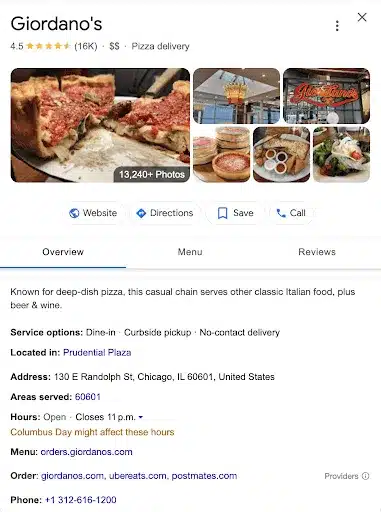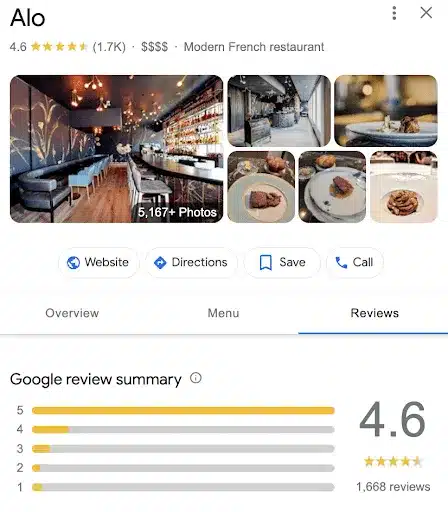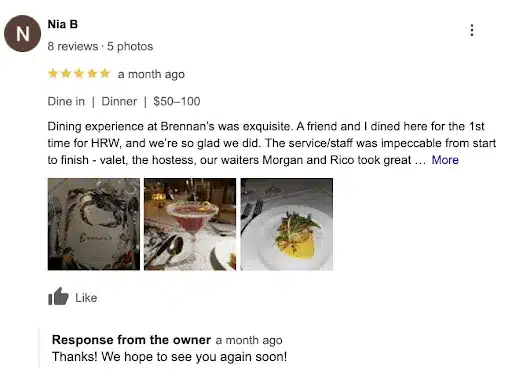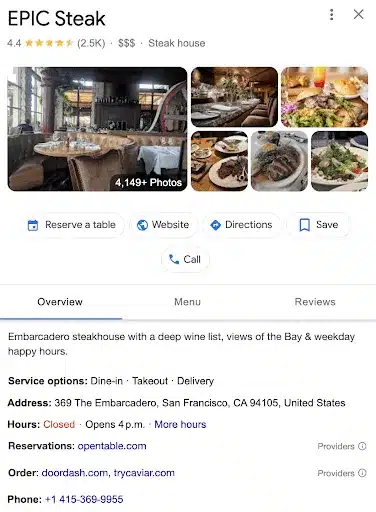If your clients own a restaurant, you know that getting customers through the door is crucial to their success. In today’s digital age, having a strong online presence is one of the most effective ways to attract new customers. This is where restaurant SEO comes in.
Unlike other types of businesses, restaurants have unique needs when it comes to search engine optimization. For example, customers are often searching for specific types of food or cuisine, and they may be looking for information about the menu, hours, and location. Additionally, local restaurant SEO is especially important, as most customers are looking for a restaurant in their immediate area.
By focusing on restaurant SEO, you can ensure that your client’s website is optimized for these specific needs, and that they’re reaching the right customers at the right time with this 12-step recipe for search engine success.
Boost local rankings with AI-powered insights and automation
Key Takeaways
- Restaurant SEO is the process of optimizing your website and online presence to rank higher in search engine results.
- Focusing on local restaurant SEO is important because it helps you meet the unique needs of customers searching for restaurants, including specific types of food and location-based searches.
- By implementing the right restaurant SEO tactics, you can improve your client’s search engine ranking, increase their visibility to potential customers, and ultimately drive more traffic to their restaurant.
What is restaurant SEO?
Restaurant SEO is the process of improving your client’s website’s visibility and ranking on search engine results pages (SERPs). By optimizing their site for relevant keywords and phrases, you can increase their chances of appearing at the top of search results when potential customers search for restaurants in their area.
SEO for restaurants involves a variety of tactics, including optimizing the website’s content, metadata, and images. You’ll also need to ensure that their website is mobile-friendly, as more and more people are using their smartphones to search for local businesses.
One especially important aspect of restaurant SEO is local SEO. This involves optimizing your client’s website for local search terms, such as “best Italian restaurant in Chicago.” By including these types of keywords in their website’s content and metadata, you can increase their chances of appearing in the local pack — the list of local businesses that appear at the top of Google search results.
Tip: Get your free step-by-step checklist for a complete local SEO audit. Download the checklist here.
Why is a restaurant SEO strategy important?
Here are some reasons why restaurant SEO is important for your clients in the industry:
1. Increases online visibility
With so many restaurants out there, it can be difficult for folks to stand out from the crowd. SEO can help you increase your client’s online visibility and reach more of their potential customers. By optimizing their website and other digital platforms, you can improve their search engine rankings and make it easier for people to find them online.
2. Attracts more customers
The more people who find your client’s restaurant online, the more customers they’ll attract. By optimizing their website and other digital platforms, you can improve their chances of being found by potential customers who are searching for restaurants in their area. More happy customers mean more good reviews, which can lead to even more people choosing to dine with your clients.
3. Builds brand awareness
SEO can also help you build brand awareness for your client’s restaurant. By optimizing their website and social media channels, you can help them create a consistent brand image and make it easier for people to recognize your client’s restaurant online.
4. Helps stay ahead of the competition
If your client’s competitors are using local restaurant SEO to attract customers, you need to be doing the same. By optimizing their website and other digital platforms, you can help them stay ahead of the competition and attract more customers to their restaurant.
5. It’s cost-effective marketing
SEO is a cost-effective way to market a restaurant. Unlike traditional advertising, which can be expensive, SEO can help your clients attract customers without breaking the bank. By optimizing their website and other digital platforms, they can reach more potential customers for less money.
To make your services even more cost-effective, consider using white-label SEO software to offer digital marketing to more clients without burning out your resources. Take things a step further with Local SEO Pro to supercharge what you can offer your clients.
12 tips to improve restaurant SEO (Overview)
- Manage and optimize your client’s Google Business Profile: Ensure it’s complete, accurate, and up-to-date with NAP details, website URL, hours of operation, and encourage customer reviews.
- Manage your client’s NAP citations: Keep NAP consistency across online directories and listings, including your website, Google Business Profile, and review sites.
- Get regular reviews and testimonials from customers: Encourage positive reviews and display them on the website and social media.
- Engage with customers on social media: Post updates, photos, and promotions, and respond to customer comments and messages.
- Ensure the website is mobile-friendly: Optimize for mobile devices with responsive design and fast loading times.
- Craft SEO content that is local: Use local keywords in website content, blog articles, and social media.
- Optimize their menu (use text-based menus over PDFs): Use text-based menus for search engine optimization.
- Build a news page for local links: Include links to local news articles and events on the website.
- Use structured data: Mark up restaurant details for better search engine understanding.
- Optimize for voice search: Use natural language and conversational keywords for voice search.
- Use alt tags for photos: Add descriptive tags to images for better search visibility.
- Ensure on-page SEO for your client’s website: Optimize page titles, meta descriptions, header tags, and internal linking for improved rankings.
If you’re looking to improve your client’s restaurant’s online presence, search engine optimization (SEO) is a must. You might want to start with a complete SEO audit to see exactly where your client’s business is.
Otherwise, here are 12 tactics to take your restaurant SEO to the next level:
1. Manage and optimize your client’s Google Business Profile
Your client’s Google Business Profile is one of the most important components of your restaurant’s online presence. Make sure the profile is complete, accurate, and up-to-date with their restaurant’s name, address, and phone number (NAP), website URL, hours of operation, and menu items. Also, encourage customers to leave reviews on the Google Business Profile, as this can help improve your client’s search engine ranking.
This pizzeria in Chicago has a properly optimized GBP:

2. Manage your client’s NAP citations
Consistency is key when it comes to your client’s NAP citations for local SEO. Make sure your restaurant’s name, address, and phone number are consistent across all online directories and listings, including your website, Google Business Profile, Yelp, and other review sites. It’s also important to have a solid handle on how Google collects NAP information for local listings.
3. Get regular reviews and testimonials from customers
Positive reviews and testimonials from satisfied customers can help boost your client’s online reputation and improve their search engine ranking. Encourage customers to leave reviews on their Google Business Profile, Yelp, and other review sites, and showcase positive reviews on your website and social media channels.
This French restaurant in Toronto has over 1600 reviews (and an impressive 4.6 rating):

4. Engage with customers on social media
Social media can be a powerful tool for engaging with customers and building a restaurant’s online presence. Regularly post updates, photos, and promotions on your client’s social media channels, and respond promptly to customer comments and messages.
See how this Houston restaurant responds and welcomes back a customer who left a positive review:

5. Ensure the website is mobile-friendly
With more and more customers using their mobile devices to search for restaurants, it’s essential that your client’s website is mobile-friendly. Make sure the website is optimized for mobile devices, with a responsive design and fast loading times.
6. Craft SEO content that is local
Creating local SEO content can help improve your client’s search engine ranking and attract more local customers. Include local keywords in their website content, blog articles, and social media posts, and create content relevant to their local community.
This San Francisco restaurant includes local keywords like “Embarcadero” and “the Bay” to improve their local SEO results.

7. Optimize their menu (use text-based menus over PDFs)
Your client’s menu is an important component of your restaurant’s online presence. Make sure the menu is optimized for search engines by using a text-based menu that is easy to read and navigate, rather than a PDF.
8. Build a news page for local links
Building a news page for local links can help improve your client’s search engine ranking and attract more local customers. Include links to local news articles and events on their website, and create content that is relevant to their local community.
9. Use structured data
Structured data can help search engines understand the content on your client’s website, which can help improve your search engine ranking. Use structured data to mark up your client’s restaurant’s name, address, phone number, menu items, and other relevant information.
10. Optimize for voice search
With more and more customers using voice search to find restaurants, it’s essential that your client’s website is optimized for voice search. Use natural language and conversational keywords in the website content, and make sure their website is optimized for local search queries.
11. Use alt tags for photos
Alt tags for photos can help improve your client’s search engine ranking and make their website more accessible to users with disabilities. Make sure all photos on the website have descriptive alt tags that include relevant keywords.
12. Ensure on-page SEO for your client’s website
On-page optimization is essential for improving search engine rankings. Make sure your client’s website is optimized for on-page factors such as page titles, meta descriptions, header tags, and internal linking. Use tools like Google Analytics and Google Search Console to monitor the website’s performance and identify areas for improvement.
Want to go further? Here are 10 more tactics to take your local search strategy to the next level.
Restaurant SEO FAQs
1. What is restaurant SEO, and why does it matter?
Restaurant SEO is the process of optimizing a restaurant’s website and online presence to rank higher in search engines like Google. It matters because it helps restaurants appear when customers search for nearby places to eat, boosting visibility, traffic, and reservations.
2. How does local SEO differ for restaurants?
Local SEO focuses on location-based searches, such as “best sushi near me.” For restaurants, this means optimizing Google Business Profile, using local keywords, and ensuring consistent NAP (Name, Address, Phone number) details across all directories.
3. How can reviews impact a restaurant’s SEO?
Positive reviews build trust and signal to Google that a restaurant is credible and relevant. Encourage customers to leave reviews on platforms like Google, Yelp, and TripAdvisor. Vendasta’s Reputation Management tools help agencies monitor and respond to reviews efficiently.
4. Why should restaurants use text-based menus instead of PDFs?
Text-based menus are easier for search engines to read and index. PDF menus can’t be crawled effectively, which means missed keyword opportunities for dishes, specials, and services.
5. What are the top tools for tracking restaurant SEO performance?
Popular tools include Google Analytics, Google Search Console, and Vendasta’s Local SEO tools. These platforms help track keyword rankings, website traffic, and customer actions to measure SEO success.
6. How important is mobile optimization for restaurant websites?
Extremely important. Most people search for restaurants on their phones. A mobile-friendly, fast-loading site improves user experience, encourages bookings, and boosts search engine rankings.
7. How can restaurants optimize for voice search?
Use conversational phrases like “Where’s the best pizza place near me?” Incorporate natural language and FAQs into your website and Google Business Profile to match how people speak when using voice assistants like Siri or Alexa.
8. What role does social media play in restaurant SEO?
Social signals from platforms like Instagram and Facebook increase brand visibility and drive traffic to a restaurant’s website. Regularly posting and engaging with followers also helps improve local SEO.
9. How can agencies manage multiple restaurant SEO campaigns efficiently?
Using Vendasta’s white-label Local SEO platform, agencies can update client listings, monitor performance, and automate key SEO tasks. This streamlines processes and saves time for agencies handling multiple restaurants.
10. What are the first steps to start restaurant SEO for a new client?
- Claim and optimize the restaurant’s Google Business Profile.
- Ensure consistent NAP details across directories.
- Build a mobile-friendly website.
- Add local keywords to pages and menus.
- Encourage reviews and link social media profiles.
Vendasta’s tools help automate these steps for faster results.

